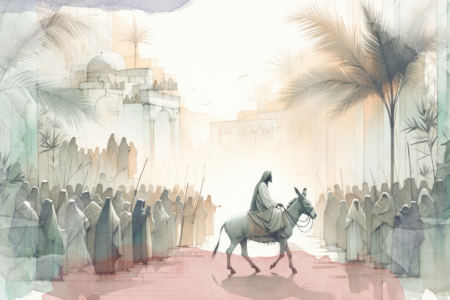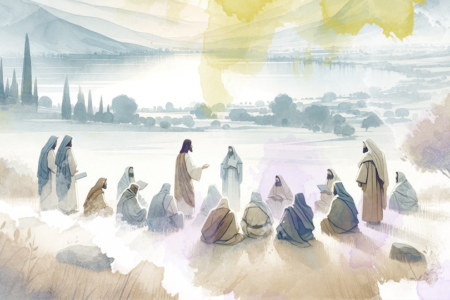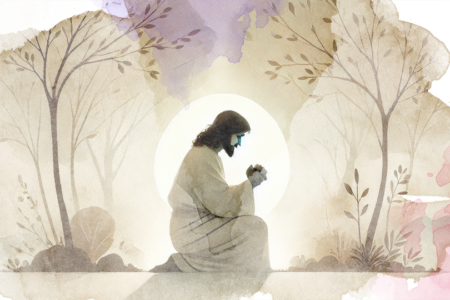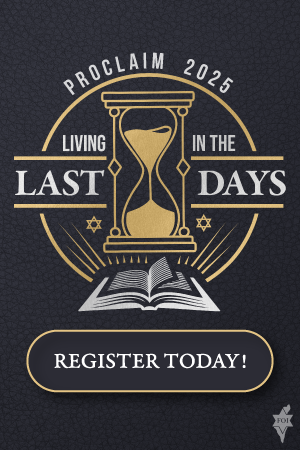The, Life, Times and Message of Isaiah The Prophet Oct/Nov 1971
JEHOVAH’S ABIDING LOVE FOR ISRAEL
ISAIAH CHAPTER 43
1-7 Jehovah will soon restore His people
1 And now, thus says the LORD, who created thee, O Jacob,
And He, who formed thee, O Israel,
Fear not, for I have redeemed thee,
I have called thee by thy name, thou art mine.
2 When thou passest through the waters, I will be with thee,
And through rivers they will overflow thee;
When thou walkest through the fire, thou shalt not be burned,
And the flame shall not scorch thee.
3 For I am Jehovah, thy God,
The Holy One of Israel, thy savior.
I have given Egypt as thy ransom,
Ethiopia and Seba in thy stead.
4 Because thou art precious in mine eyes, and honorable,
And I have loved thee, therefore will I give men for thee,
And peoples for thy life.
5 Fear not, for I am with thee,
I will bring thy seed from the east,
And will gather thee from the west.
6 I will say to the north: give up,
And to the south: keep not back,
Bring my sons from far away,
And my daughters from the ends of the earth;
7 All those who bear my name,
And whom I have created for my glory,
Whom I have formed and whom I have made.
Comment:
1 And now, thus says the LORD, who created thee, O Jacob
The description of Israel’s tragic plight in 42:18-25 is followed by the assurance of Jehovah’s unchanging love for His people. This is a passage of singular beauty and tenderness, of exhortations, followed by comforting reassurance of God’s abiding love. The alternating rebukes, dire predictions and encouragements are typical of both parts of Isaiah, and of the prophetic writings in general.
Fear not, for I have redeemed thee.
Jehovah sees Israel’s restoration as an already accomplished reality. With this in view Israel need not fear, only trust her God.
2 When thou passest through the waters.
No matter what the peril, Jehovah will protect His people. The waters will not drown them, nor will the flames consume them. Israel’s historical experiences and their faith in these glorious promises have helped to preserve the nation during the millennia of a perilous existence.
3 I have given Egypt as thy ransom,
The reference to Egypt has a double significance: it is a reminder of Israel’s exodus from Egypt and a promise of God’s readiness to intervene again on their behalf. This time the Lord will use Cyrus as His instrument of redemption.
4 Because thou art precious in my eyes, thou art honorable and I have loved thee.
A moving declaration of Jehovah’s love for Israel. Mighty Babylon and Egypt may hold in contempt captive and defeated Israel, yet in God’s sight they remain precious and honorable.
5 Fear not, for I am with thee.
The mystery of Israel’s survival is rooted in the fact that God was and is with his people. Their survival is not due to their own merit, but to God’s purpose for them: “I have created them for my glory” (v. 7). God sees His people not the way they are, but with an eye to the glorious destiny for which He has created them.
Verses 8-13 Israel, the Blind and Deaf Servant of the Lord
8 Bring forth the blind people, who have eyes,
And the deaf who have ears.
9 Gather together all the nations,
And let the people be assembled.
Who among them can declare this,
And explain the happenings of the past.
Let them bring their witnesses that they may be justified,
Or let them listen and say: this is true!
10 You are my witnesses, says the LORD
And my servant, whom I have chosen,
That you may know, and believe me,
And understand that I am He.
Before me there was no God formed,
And after me there will be none.
11 I, only I, am the LORD,
And beside me there is no saviour.
12 I have proclaimed, and I have saved,
And I have announced, and there was no alien god among you,
And you are my witnesses, says the LORD,
And I am God.
13 Even since that day I am he,
And there is none that can deliver from my hand,
I will do and who will undo?
Comment:
Verses 8-13
In spite of their spiritual blindness and deafness, Israel remains God’s witness against the idols and their worshippers, because the future of Israel was foretold in advance by the prophets of God. No idol could do this.
There are striking similarities between the servant of Jehovah as a nation and the servant of Jehovah as a person. Both are chosen of God (42:1, 43:10). Both are beloved (42:1, 43:4). Yet the differences between the two are basic. Obedient or disobedient, “the servant” Israel is a witness to the faithfulness of God and that there is no other God who is like Jehovah. Collectively Israel is a blind (v. 8) and essentially passive servant (v. 10). By contrast the individual servant of Jehovah is God’s active agent to accomplish His divine purpose for mankind. The individual servant of the LORD, the Messiah, is the absolutely obedient messenger of God who delights to do His will (42:4).
14-21 Babylon will soon fall and Israel will be restored
14 Thus says the LORD, the Holy One of Israel,
For thy sake have I sent to Babylon,
And I will bring them all down as fugitives,
And the Chaldeans in the ships of their rejoicing.
15 I am the LORD, your Holy One,
The creator of Israel, your king.
16 Thus says the LORD, who makes a way in the sea,
And a path in the mighty waters,
17 Who brings forth chariot and horse, army and might.
They lie down together, never to rise again,
They are crushed, extinguished like a wick.
18 Do not bring to mind ancient events,
Neither consider the things of long ago.
19 Behold I do a new thing, shall you not know it?
I will make a way in the wilderness, And rivers in the deserts.
20 The wild beasts shall honor me,
The jackals and the ostriches,
Because I cause waters to gush forth in the wilderness,
And rivers in the desert,
To give drink to my chosen people.
21 This people have I formed for myself,
That they may proclaim my praise.
Comment:
14-21 Jehovah is about to perform a new miracle, surpassing in grandeur the exodus from Egypt: Babylon will be destroyed and Israel set free.
14 For thy sake have I sent to Babylon
The expression “for thy sake” (one word in Hebrew “lemaanha”) implies conviction that the LORD directs the destiny of nations to serve His purpose Israel’s redemption.
The Chaldeans in the ships of their rejoicing.
A difficult passage which is variously interpreted. Our translation appears to come closest to the meaning of the original text. “The Chaldeans” is the poetic and archaic name of the Babylonians.
“The ships of their rejoicing,” an apparent reference to the Babylonian pleasure ships on the Euphrates, which the Persians would use to deport the fugitive Babylonians.
16 A way in the sea, a path in the mighty waters.
An allusion to the miracle of the Red Sea in the days of Moses (Ex. 14:13-31)
17 Who brings forth chariot and horse, army and might —
A further allusion to the events at the Red Sea.
18 Do not bring to mind ancient events.
Hitherto the deliverance from Egypt was the most celebrated event in all the history of Israel, but now even greater things are about to happen.
19 Behold I do a new thing, shall you not know it?
When the hour of her deliverance will arrive, with all its miraculous occurrences, Israel, in spite of being deaf and blind, would be forced to acknowledge that Jehovah has done it.
21 This people have I formed for myself,
That they may declare my praise.
This poignant declaration sums up Jehovah’s ultimate purpose for Israel: they are a people whom the Creator has fashioned for the express purpose that they might glorify Him, – a high and glorious calling indeed.
Verses 22-28 The ingratitude of a nation
22 Yet thou hast not called upon me, O Jacob,
Far thou hast become weary of me, O Israel.
23 Thou hast not brought me the sheep of thy burnt offerings,
Neither hast thou honored me with thy sacrifices.
I have not burdened thee with meal offerings,
Nor troubled for incense.
24 Thou hast not bought me sweet cane,
Nor filled me with the fat of thy sacrifices.
Yet hast thou burdened me with thy sins,
And wearied me with thy iniquities.
25 I, only I, blot out thy transgressions, for my own sake,
And thy sins will I not remember.
26 Put me in remembrance, let us judge this together,
Declare thy case, that thou mayest be justified.
27 Thy first father sinned,
And thy intercessors transgressed against me,
28 Therefore have I profaned thy holy princes,
And have delivered Jacob to the ban,
And Israel to blasphemings.
Comment:
Verses 22-24
The prophet identifies himself with his people in exile. The temple, its ritual and sacrifices have become a thing of the past. No longer does God burden his people with demands for sacrifices or other ritual obligations. Yet Israel still continues to dishonor Jehovah, just as they did before their exile. With or without sacrifices, they continue to burden the LORD with their sins and iniquities, just as in the past.
25 I, only I, blot out thy sins, for my own sake.
Just as in the opening chapter of Isaiah, the prophet continues to wrestle with the false notions that in order to obtain forgiveness from God, animal sacrifices and other “religious” rites, are indispensable. In reality it is the LORD Himself, who for His own sake alone, forgives sins, irrespective of man’s so-called pious acts. The Lord cannot be bribed with sacrifices. “Wash you, make you clean . . . cease to do evil”, (Isaiah 1:16), is implied here also.
26 Put me in remembrance, let us judge this together.
These words bring to mind Isaiah 1:18
“Come now, let us reason together, says the LORD
Though your sins be like scarlet
They shall be white as snow.”
27 Thy first father sinned . . .
A reference to Abraham, who although a “friend of God,” nevertheless was not without sin (Gen. 15:8).
“Thy intercessors” are the prophets and teachers of Israel, “the holy princes,” the priestly hierarchy, who, like the rest of their countrymen, were caried off into exile.
28 Jacob to the ban – Israel to blasphemings.
Israel’s suffering and tragedy is self imposed, the result of their continued disobedience to God and spiritual myopia.
Repentant Israel promised the Spirit. The idols are taunted.
Cyrus appointed the agent of deliverance.
ISAIAH CHAPTER 44
Verses 1-5 Israel, the Servant of Jehovah is reassured.
1 And now hear, my servant Jacob,
And Israel, whom I have chosen:
2 Thus says the LORD, who made thee,
And fashioned thee from the womb,
Who will help thee:
Fear not, my servant Jacob,
And thou, O, Jeshurun, whom I have chosen.
3 For I will pour water upon the thirsty land,
And streams upon the dry ground:
I will pour out my spirit upon thy seed,
And my blessing upon thy offspring.
4 They will spring up like grass,
And like willows by the streams of water.
5 One will say: I am the LORD’S.
Another will call himself by the name of Jacob
And yet another will write on his hand: to the LORD,
And will surname himself by the name of Israel.
Comment:
Verses 1-5
In sharp contrast to the somber closing words of chapter 43 in which the prophet explains the reason of Israel’s terrible plight, he now foretells a time of unprecedented blessing. The LORD will pour out His spirit upon His people and their offspring. Even gentiles seeing how God is blessing Israel, would attach themselves to them and bear allegiance to Jehovah.
This prophetic passage (v. 1-5) is reminiscent in tone of Zechariah 8:23. The name Jeshurun (v.2) is synonymous with Israel and is derived from the root “yashar” “to be upright.” It is therefore a title of honor and endearment. Jehovah sees His people not as they are, but as He intends them to become in the end, —a righteous and upright people.
3 I will pour water upon the thirsty land.
The Hebrew adjective “tzame” – thirsty, may refer either to a thirsty land or thirsty people. However, the parallel phrase “dry ground,” indicates that the word “land” is implied.
3b I will pour out my Spirit upon thy seed.
The primary sense of the passage is spiritual and speaks of the future regeneration of Israel which will bring blessing to all of mankind. Their turning to God, will attract others to Jehovah and to the people of Jehovah. In contrast to Israel’s former state when they were delivered to the gentiles to be treated with contempt and as an object of blasphemings (Isaiah 43:28), they will in the future become an honored people, with whom non-Jews will seek to identify themselves and also with their God.
5 Another will write on his hand to the LORD.
It was a custom among many pagans to tattoo upon their hand the name of their god, or, in the case of a slave, to inscribe the name of the owner to whom he belonged.
. . . And will surname himself by the name of Israel (v. 5d)
The newly converted gentiles will add to their names the surname “Israel” as a mark of their admiration for the regenerated people of Jehovah.
Verses 6-8 Jehovah alone is God and Israel is His Witness
6 Thus says the LORD, the king of Israel,
And his redeemer, the LORD of hosts:
I am the first and last,
And besides me there is no god.
7 And who is like me, let him proclaim it.
Let him declare it and set it forth before me,
Since I have established the ancient people.
Let them announce future events,
And that which will yet come to pass.
8 Fear not, neither be afraid.
Have I not announced it to thee long ago and told thee?
And you are my witnesses, whether there is any god beside me.
No, there is no rock, I know none.
Comment:
Verses 6-8
Jehovah declares that He alone is God, He alone has made known to His people their future. The idols cannot do this because they are not gods.
Israel remains forever a living witness to Jehovah and to His Word.
Verses 9-20 A taunting satire against the idols, their makers, and their worshippers.
9 All the makers of idols are vanity,
And their precious works are useless,
Their witnesses see nothing and know nothing,
And so they will be put to shame.
10 Who has fashioned a god or a molten image which is of no use?
11 Behold all their makers shall be ashamed,
Let all their sculptors who are skilled above other men,
Assemble themselves, and let them stand up.
They shall be terrified and ashamed together.
12 The smith with his tongs.
He works in the coals and fashions an image with hammers.
He toils with his strong arm,
And becomes hungry and weary.
He drinks no water and is exhausted.
13 The carpenter draws a line,
He marks it out with a stylus.
He fits it with planes,
And outlines it with the compass.
Then he shapes it after the figure of a man,
According to the beauty of a human being, to dwell in the house.
14 He cuts down cedars and takes a cypress or an oak,
Which he has picked out among the trees of the forest.
He plants a fir tree and the rain makes it grow.
15 Then a man uses it for fuel,
He takes some of it to warm himself,
With some he kindles a fire and bakes bread.
He also makes a god and worships him,
He makes himself a graven image and falls down before it.
16 One part he has burned in the fire.
With one part he eats meat. He roasts a roast and is satisfied,
He warms himself and says: “Ah, I am warm, I have seen the fire.”
17 With that which is left he makes a god, an idol,
He falls down to it, he worships it and prays to it.
And says, “Oh save me, for thou art my god!”
18 They do not know and do not understand,
For their eyes are glued together so that they cannot see,
And their hearts do not comprehend.
19 And none considers it in his heart,
Nor has he the knowledge or sense to say:
“I have burned the half of it in the fire,
And I have baked bread on its hot coals,
I have roasted meat and eaten it.
And shall I make an abomination with what is left,
And fall down to a chunk of wood?”
20 He feeds on ashes,
A deluded heart has led him astray.
He will not save his soul and he will not say:
“Is not that which I hold in my hand a lie?”
Comment:
Verses 9-20
With impassioned scorn the prophet describes the idol makers and “their precious works,” the idols. He mentions some of the tools and materials which the idol makers employed in the production of their useless gods.
The prophet is amazed at the foolishness of the man who uses the same tree to bake bread, to roast meat and makes of what is left a god beseeching him: save me for thou art my god (v. 15). The only answer to this aberration is that the idol makers and worshippers are so blind and deluded that they have lost the ability to see and to understand their actions, because they have been feeding on ashes for too long (v. 20). This passage presents the prophet’s strongest denunciation of the idols and the ridiculous worship of “a chunk of wood.”
Verses 21-22 A call to repentance
21 Remember these things, O Jacob and Israel
For thou art my servant.
I have formed thee, thou art my own servant, O Israel, do not forget me.
22 I have blotted out thy transgressions, like a cloud,
And thy sins like a mist.
Return to me for I have redeemed thee!
Comment:
21 Remember these things . . . do not forget me.
After exposing the idols as being utterly worthless, the prophet bids his people to remember that. Israel is the servant of the Lord, and must never get it.
22 I have blotted out thy transgressions like a cloud . . .
Return unto me, for I have redeemed thee . . .
One of the most touching declarations of God’s love for His people. The cry: “return unto me” is the very heart of the prophetic message. Alas, it remained mostly unheeded.
Verse 23 A short hymn of praise.
23 Sing, O heavens, for the LORD has done it,
Shout, you depths of the earth,
Break forth into exultation, you mountains,
The forest and all its trees,
For the LORD has redeemed Jacob
And glorified Himself in Israel.
Comment:
23 This brief call upon heaven and earth to exult in the redemption of Israel is in harmony with the first chapter of Isaiah, which begins with a call to heaven and earth to be witnesses of Israel’s rebellion against their maker and redeemer. Now heaven and earth are called upon to take part in the joyful celebration of Israel’s redemption.
Verses 24-28 Jehovah has appointed Cyrus to fulfil His purpose.
24 Thus says the LORD, thy redeemer,
And he who has fashioned thee from the womb,
I am the LORD who made all things,
Who stretched out the heavens above,
Who spread out the earth by Himself;
25 Who frustrates the signs of the lying prophets,
And makes fools of the diviners.
Who turns back the wise men,
And makes their knowledge foolish,
26 But confirms the word of his servant,
And carries out the counsel of His messenger.
Who says to Jerusalem: “she shall be inhabited again.”
And to the cities of Judah: “they shall be rebuilt
And I will raise up again their ruins,”
27 Who says to the deep: “be dry,
And I will dry up thy rivers.”
28 Who says to Cyrus: “he is my shepherd
And will carry out all my will,”
Saying to Jerusalem: “she shall be rebuilt”
And to the temple: “its foundation shall be laid.”
Comment:
24 Thus says the LORD, thy redeemer.
The omnipotent creator of all things is the God who called Israel into being and also redeemed her. Actually the whole passage (vs. 24-28) is one long sentence. It is logically constructed to prepare for the introduction of Cyrus as Jehovah’s shepherd, and the appointed agent to perform His will.
The God of Israel brings to nought all the vain prattlings of the lying prophets (“baddim” – the babblers). All the vaunted knowledge of the pagan diviners is foolish nonsense (V. 25). But He confirms the message of His servant, (in this instance of the prophet Isaiah, and of all His messengers, the prophets).
This God says to Jerusalem that she shall be inhabited again and the temple of Jehovah shall be rebuilt (v. 26).
27 Who says to the deep: be dry . . .
Jehovah is about to perform another miracle. He will dry up the deep, a possible allusion to the celebrated act of Cyrus in diverting the Euphrates and the canals surrounding Babylon into an artificial lake, before he captured the great metropolis Babylon.
The Greek historian Herodotus recorded this event in his History, relating how Cyrus dried up the Euphrates, so that it was only one foot deep, by diverting its waters into the basin of Sepharvaim. In this way the Persian army was able to enter unexpectedly, the supposedly impenetrable city of Babylon.1
28 Who says to Cyrus: he is my shepherd.
Here is an unusual instance of a yet unborn king, mentioned by name about 150 years before the event. Since we have discussed this fully in the introduction to the I and II parts of Isaiah, we shall not repeat here our previous remarks.
The name Cyrus, in Hebrew “Koresh”, appears on ancient Persian monuments as Kuru, which is also the name of a river in southern Persia. It is generally assumed that the name Cyrus was derived from the name of that river.
According to Josephus,2 when this passage of Isaiah, which mentions Cyrus as the liberator of the Jews, was brought to the attention of the king, he promptly decreed the return of the Jews to Jerusalem and gave them permission to rebuild the temple.
ENDNOTE
- Herodotus, History 1, 187-193, Penguin edition.
- Josephus Antiquities, XI, 2.







